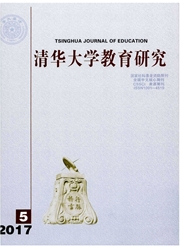

 中文摘要:
中文摘要:
实行"地方为主、分级管理"的分权管理和以"普及九年制义务教育"为"重中之重"是我国基础教育管理体制的核心特征。本文在此背景下,运用公共经济学中关于财政分权、标尺竞争与公共支出结构偏向的相关性研究的理论和方法,探讨了学前教育投入不足的制度原因。通过构造教育财政分权指标、并基于1998年-2010年的省级面板数据,证明重心偏下的基础教育财政分权制度以及对"普九"政绩考核的标尺竞争,在公共支出结构上造就了地方教育部门"重义务教育、轻学前教育"的严重偏向,这是导致"入园难、入园贵"问题的制度诱因。
 英文摘要:
英文摘要:
China's basic education administration system has two unique characteristics:delegating fiscal responsibilities to local authorities and giving top priority to making the nine-year compulsory education universal.This paper applies the theories of fiscal decentralization,yardstick competition,and public expenditure composition bias to explore reasons for the shrinkage of public investment in preschool education.By constructing educational fiscal decentralization indicators,and based on provincial panel data from 1998 to 2010,this empirical study finds that excessive fiscal decentralization in basic education and the yardstick competition for higher performance evaluation in nine-year compulsory education induced local governments' inclination to emphasize primary education investment and neglect preschool education investment.
 同期刊论文项目
同期刊论文项目
 同项目期刊论文
同项目期刊论文
 期刊信息
期刊信息
